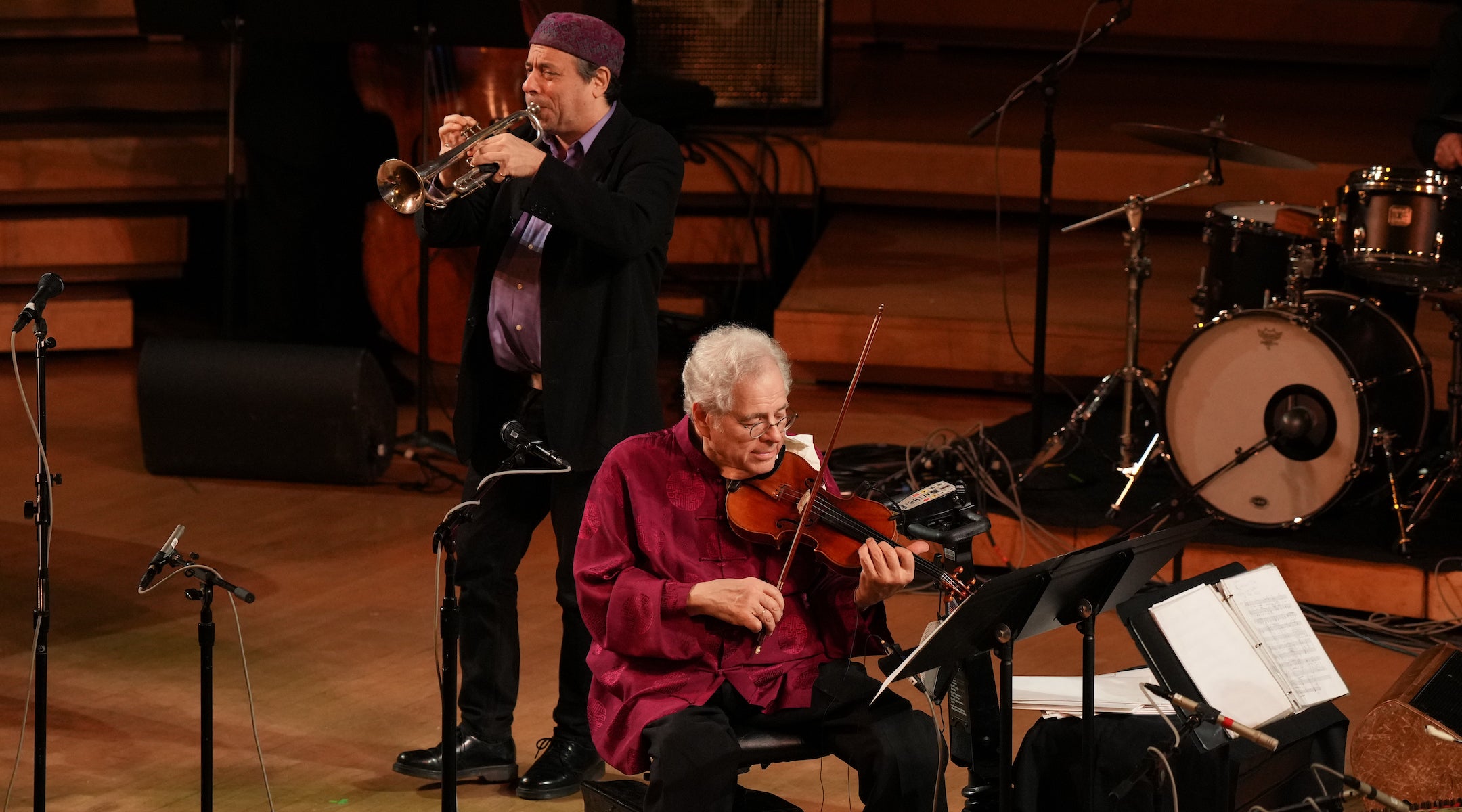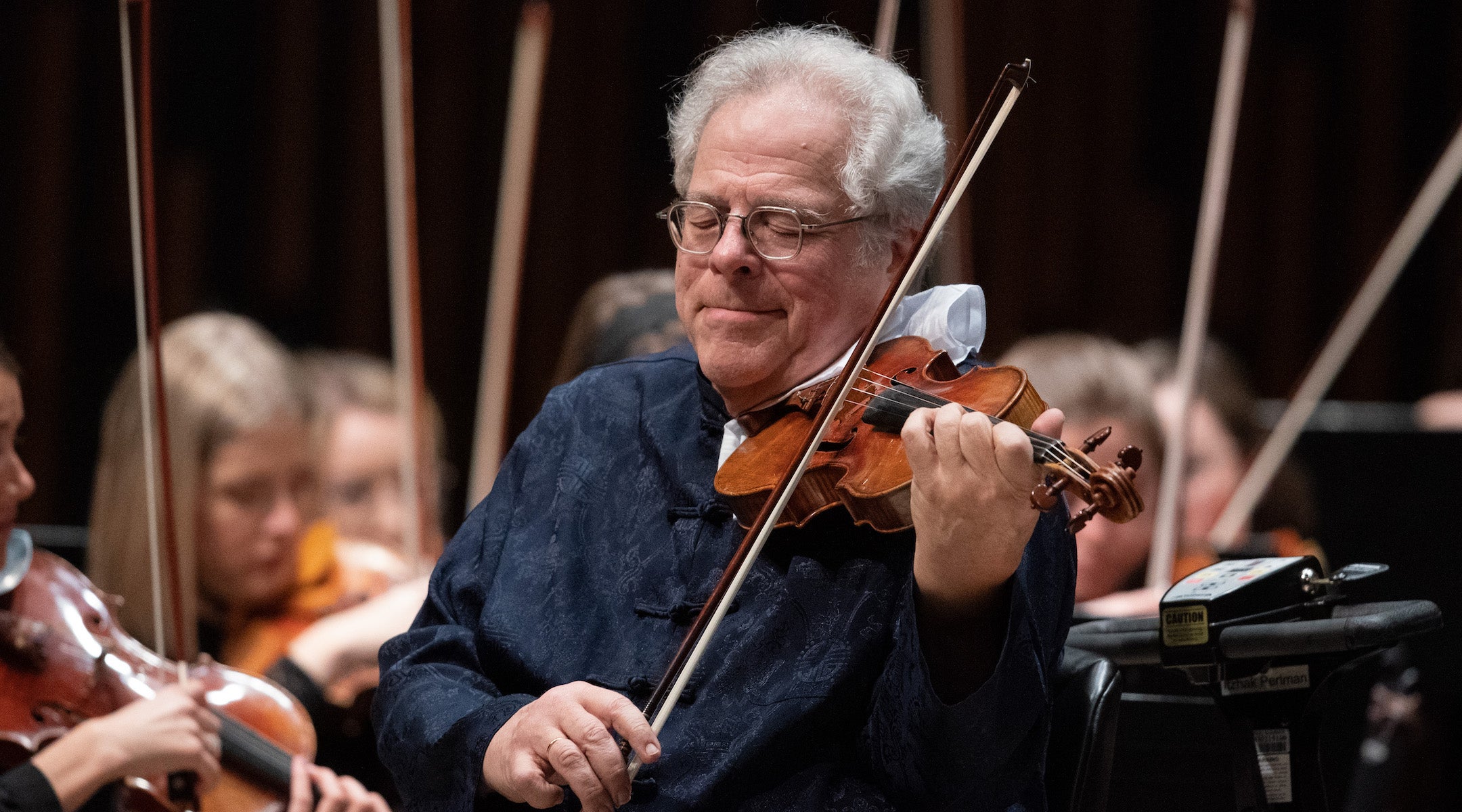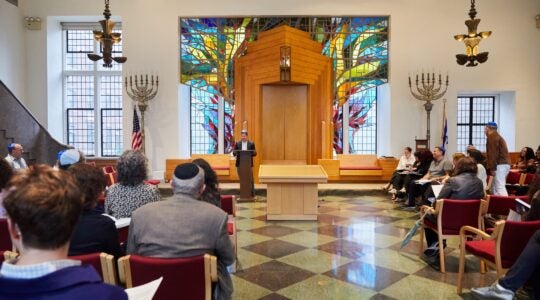“Being a fan of the Mets is like very, very much being Jewish — you know, you suffer,” Israeli-American violinist Itzhak Perlman tells me. “Every now and then, you have wonderful, wonderful, great, great, great celebration — and then some more suffering.”
Perlman, who turned 80 on Aug. 31, was describing his recent birthday celebration — a Chinese dinner in Flushing with loved ones, followed by a trip to Citi Field “to watch the Mets lose,” as he described it.
Ever the optimist, the virtuoso — who has won a whopping 16 Grammys and has conducted and performed with orchestras all over the world — isn’t one to let a little thing like the Mets’ late season collapse bring him down. In fact, he’s gearing up to honor his milestone birthday with a major public celebration: a performance of his klezmer masterpiece, “In the Fiddler’s House,” at the Beacon Theater on Monday.
There, Perlman will take the stage alongside klezmer greats like Hankus Netsky, Andy Statman and members of the Klezmatics and the Klezmer Conservatory Band. Though it’s billed as a birthday celebration, the concert also marks the 30th anniversary of the “In the Fiddler’s House” album and the PBS “Great Performances” special — in which Perlman travels to Krakow to learn about, and learn how to play, klezmer music — that inspired it.
“It’s music that is close to my heart,” Perlman, who was classically trained at the Academy of Music in Tel Aviv (now the Buchmann-Mehta School of Music) and, later, the Juilliard School in New York, said of his connection to klezmer. “I grew up with it in Israel, without actually playing it.”
These days, playing klezmer “is something quite comfortable for me to do,” he said, noting that he’s been playing this music with “most of the same cast of characters” for three decades. “It’s going to be a lot of fun. I’m really looking forward to it.”
Ahead of the concert, Perlman and I chatted on the telephone about his childhood in Tel Aviv, what it’s like being an Israeli-American artist today, how music can change hearts and minds, and more. Keep scrolling to read our conversation.
This interview has been condensed and lightly edited for clarity.
I was able to watch most of the 1995 PBS special, “In the Fiddler’s House,” on YouTube. It was really wonderful — particularly the scene in which you’re sharing a meal at Sammy’s Roumanian with Fyvush Finkel and Red Buttons — but what really struck me was the very 1990s sense of optimism about the future of Jewish culture, and in the resurgence of Jewish culture in Poland, in particular. Does that resonate with you, and do you feel that same optimism today?
I do. They had a lot of fantastic audiences there in Poland; they really were very enthusiastic about klezmer music. When something is good quality — the reaction of the audience, when we performed, were always very much into it — which leads me to believe the future is good.
I’m always an optimist. A lot of people are like, “Oh no, it’s not the same.” [But] when you hear something and the quality is good, and it’s genuine, the people will still think that it’s something that appeals to them and touches them.
You’re probably the most famous Israeli American in the world. These days, as the war between Israel and Hamas reaches its two-year mark, Israeli artists around the world are facing isolation, even boycotts. How are you navigating this?
I’m being very private about my feelings — I feel that things are really very bad. I have one word that keeps coming to my head, and that word is hope. I’m just hoping that things will get better.

Itzhak Perlman, center, pictured here with Klezmatics trumpeter Frank London, plays “In the Fiddler’s House” with the Chicago Symphony Orchestra on Dec. 4, 2022. (Todd Rosenberg)
Within the classical music world, in particular, there’s been some recent dustups — two weeks ago, an Israeli conductor called for the end to the war in Gaza at a concert at London’s Royal Albert Hall; the day prior, a Belgian music festival canceled the performance of the Munich Philharmonic because it was being led by Lahav Shani, the music director of the Israeli Philharmonic. What do you make of this?
Well, that’s what happens when things are so bad, you know? People have different kinds of reactions, and how they want to react to what’s happening, and they want to express their feelings and so on and so forth. I always find that music should be something that’s all above that — music should be a healer, not something that is weaponized. But I can’t blame people for feeling the way they feel, from either side.
You were born in Tel Aviv, in pre-state Israel. Do you have any particularly strong, standout memory from childhood? What are the differences between the Israel of your youth and the Israel of today?
Well, everything has changed. I used to live on a street where there were [just] a few cars parked, there was always room for people to play in the street. If you go to the same street, it’s parked solid on each side, there’s no room to do anything. That’s the normal thing — Tel Aviv was a different city. Now, it’s a modern, bustling contemporary city. It’s all different.
How long have you lived on the Upper West Side?
Let’s see. Since 1958.
What are some of your favorite Jewish spots in the neighborhood? Or if someone says to you, “Hey, I’m coming to New York and I want to do something Jewish,” what would you suggest?
You can go to shul — that’s Jewish. There are many shuls around. There used to be a lot of kosher butchers around, but right now, there’s very few. So that has changed as well. I try to stay home; I don’t go out that much. You can always have food delivered — that’s one of the things that’s changed. If you want to, you never have to leave the house. You take the telephone, you can have anything, just by phone. It’s quite amazing.
And now, you don’t even have to speak to anyone! You can do it on a computer.
Exactly. It’s quite incredible.
Your career has been packed with highlights — since your breakout, at 13, on “The Ed Sullivan Show,” you’ve played for Queen Elizabeth at the White House, for President Barack Obama’s 2009 inauguration, at the Academy Awards, too many to mention. Is it possible to pick one standout moment?
That’s so difficult to answer. One highlight was going with the Israel Philharmonic to Russia [in 1990], and playing at that time in Moscow, which was, again, an indication of diplomatic relations. I always thought that music was like a barometer; through music, you can tell [a] nations’ relations — if they get the orchestra to come and play concerts, relations are warming up a little bit. So that was one highlight.
To me, you’ll always be most famous for being on “Sesame Street.” I was 3 or 4 years old when those episodes came out, so I feel like I have known you my whole life. Do people ever ask you about it?
Oh yes, all the time. And they make me feel really old. “Oh, I saw you on ‘Sesame Street’ when I was 4 years old.” Thanks a lot.
What should the audience expect at Monday’s concert?
It’s going to be a party.
Itzhak Perlman will play the Upper West Side’s Beacon Theater (2124 Broadway) on Monday, Sept. 29 at 7:30. For tickets and more information, click here.
The New York Jewish Week brings you the stories behind the headlines, keeping you connected to Jewish life in New York. Help sustain the reporting you trust by donating today.




